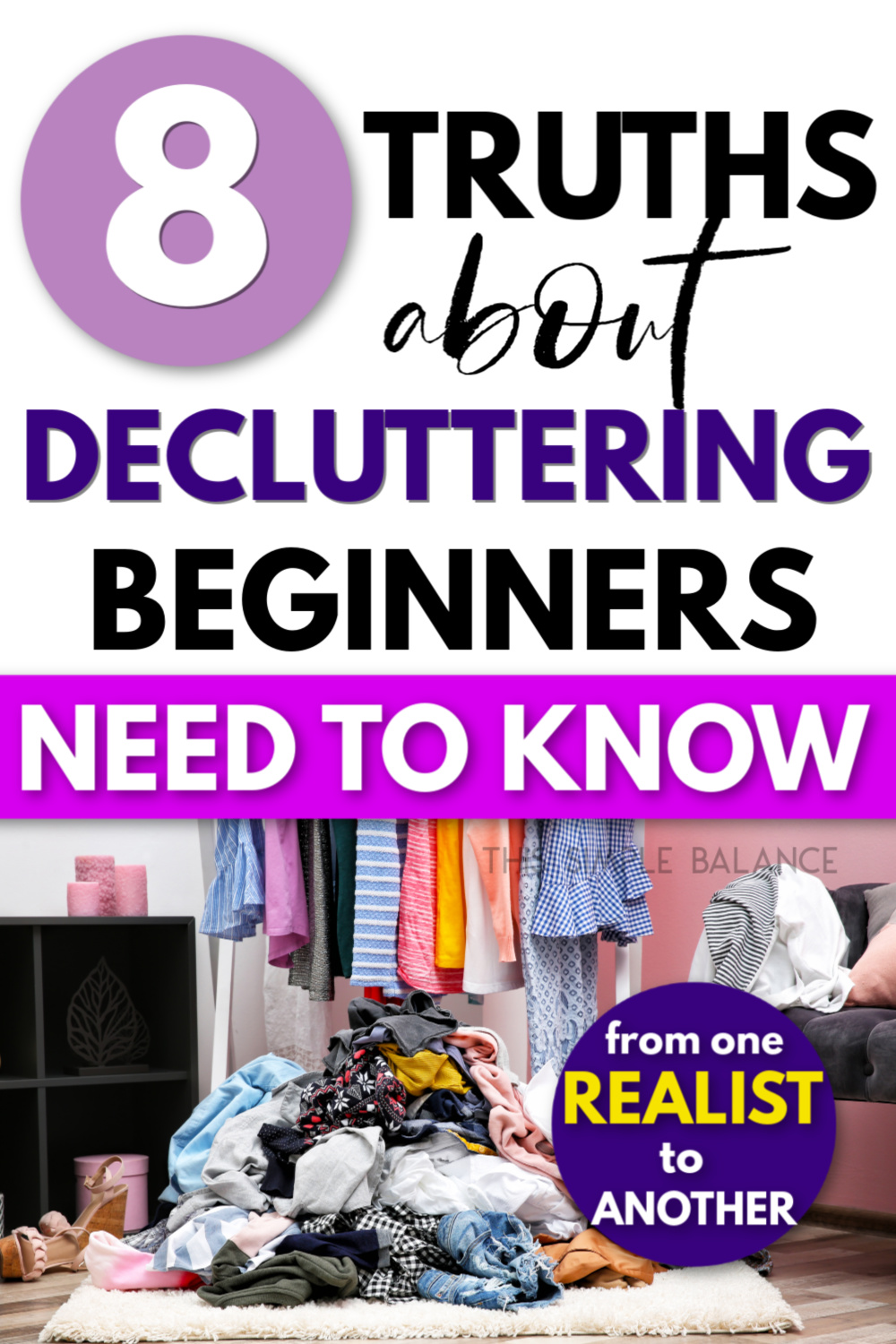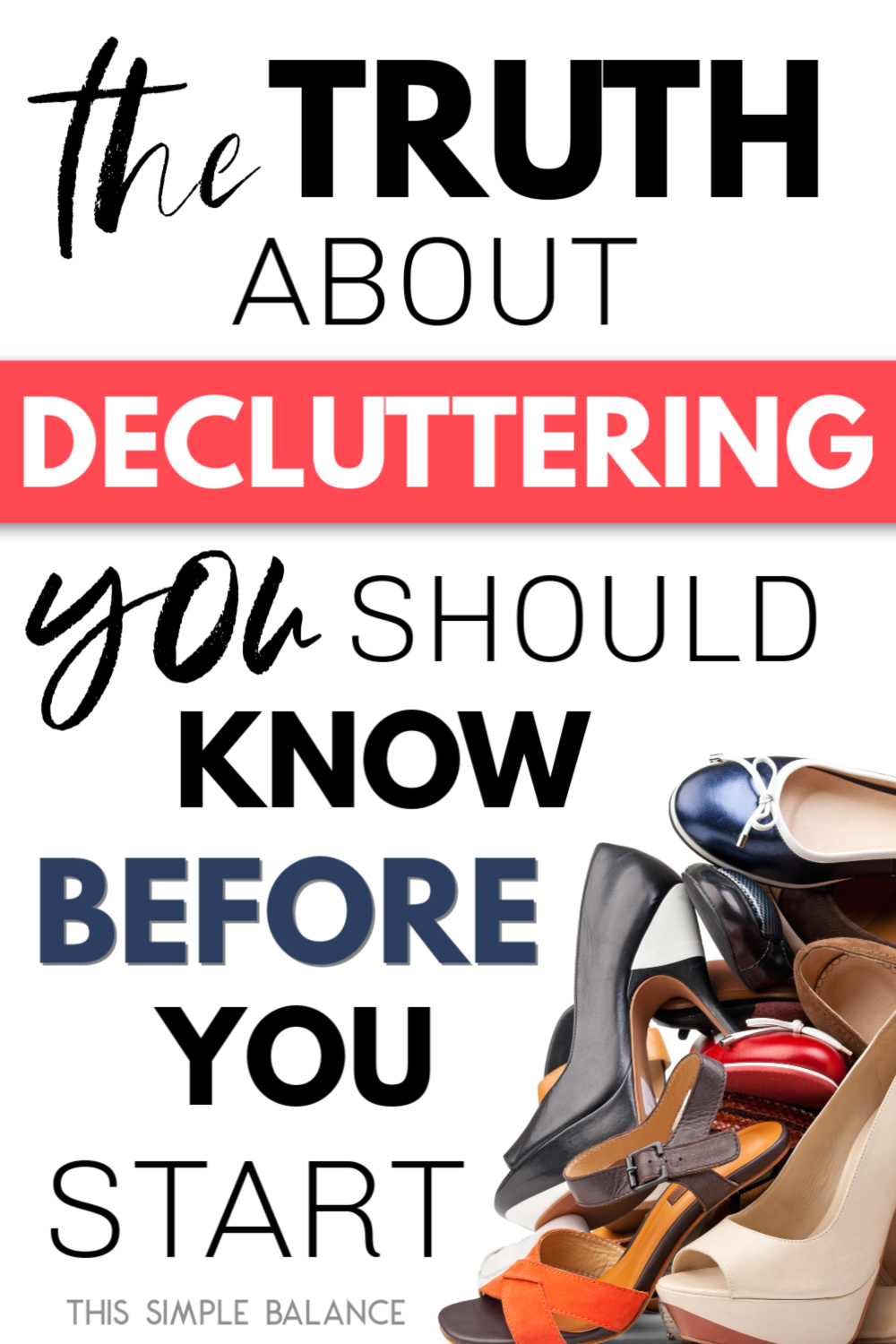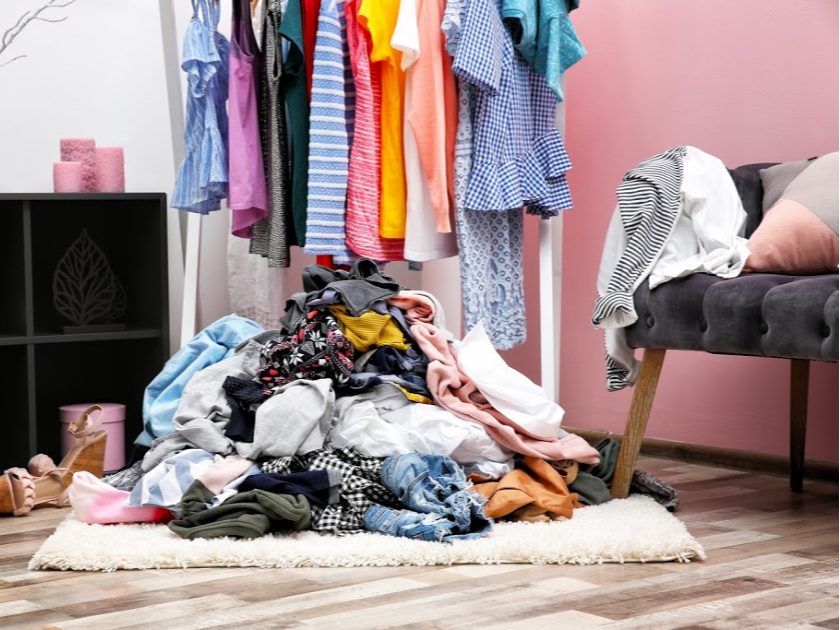Inside: Curious about decluttering, but haven’t started yet? If everything you’ve read sounds suspiciously positive, you’ll appreciate this full disclosure before you start decluttering.
Any blogger who writes about decluttering will tell you it’s life-changing. I’m right there with them.
We’ll all tell you that after decluttering, you will:
- spend less time cleaning your house
- be able to actually find the stuff you need (most of the time)
- have less anxiety
- waste less money on buying things you already have
- spend more time on the things that matter to you
The list of benefits goes on and on. Decluttering has changed our lives for the better, and we want that same transformation for you, too.
Talking about the not so awesome parts of decluttering doesn’t seem like the best way to get you to jump on board.
However, as much as I want you to experience the benefits of decluttering, I don’t want you to jump in blindly either.
I’ve come to the conclusion that knowing a few things in advance is not only nice, but necessary.
Because just like any other lifestyle change, decluttering can get messy and complicated. It’s not always the delightful or straightforward a process you imagined it would be.
Is it still worth doing? Absolutely!
But it’s only fair you know what you’re getting yourself into before you actually start.
Related: 7 Best Marie Kondo Tips That Are Pure Genius

8 Things You Should Know Before You Start Decluttering
THIS POST PROBABLY CONTAINS AFFILIATE LINKS. AS AN AMAZON ASSOCIATE, I EARN FROM QUALIFYING PURCHASES. YOU CAN READ OUR FULL DISCLOSURE POLICY HERE.
1. There isn’t one “right” way to declutter.
As bloggers, we use words like “best” and “easiest” and “awesome” to describe our particular decluttering methods. And for some of you, our method really is the best, easiest and awesome-est way (and yes, I made up “awesome-est”).
The truth is it might NOT be the best method for everyone.
Different personalities benefit from different methods, starting in different rooms, and asking different questions.
Decluttering by categories, Konmari style, works beautifully for some people. For others, it can make a huge, overwhelming mess that makes them want to stop decluttering instead of continue.
In his new book The Minimalist Home, Joshua Becker suggests that the best place to start decluttering is the living room. That’s pretty much the complete opposite of what I recommend, but hey? Who am I to argue with someone whose decluttering course thousands have taken and enjoyed? It must work really well for a LOT of people.
Allie Casazza, by her own admission and in contrast to Marie Kondo’s extremely gracious approach, doesn’t beat around the bush. She’s going to straight up confront you about your clutter – I mean, why the heck are you hanging onto that stuff you don’t use! Just get rid of it already!
Dana White helps people who aren’t naturally organized and have a hard time actually seeing clutter in the first place.
As someone who specifically helps people declutter on lower incomes, I have a lot more grace for slow decluttering, taking your time and keeping the things you’re not sure about longer than perhaps another minimalist would recommend.
We’re all partial to our own methods, but you know what we care even more about?
That you stop listening to us talk about decluttering and that you actually start decluttering.
We don’t want you to get stuck trying to choose the best method.
Find someone whose personality and lifestyle is similar to yours, and do what they recommend.
Put your blinders on, listen to whoever resonates with YOU, and just get it done.
(My personal favorite decluttering book is this one).
Related: Top 12 Decluttering Books for a Clutter-Free Home
2. There is no “right” number of things to keep.
I’ve read so many books on minimalism and decluttering over the past year, and almost all of them off suggested numbers of things to keep.
Those numbers are suggestions.
They are giving you a rule of thumb, a number of a particular item that will most likely be enough.
But they don’t live with you, they don’t know your family size or your specific circumstances. You have to use your own knowledge of your lifestyle and habits to make those decisions yourself.
Please don’t get rid of that duplicate spatula if you cook with it three times a day.
Don’t get rid of your extra three bath mats if you have little boys who don’t know how to get the pee in toilet (unless you want to do an extra load of laundry every other day). #reallife
Don’t get rid of your entire coffee mug collection that you truly love and frequently use just because minimalist author such and such said to declutter your sentimental items (they didn’t mean all your sentimental things – promise).
As much as it would be nice to have a prescription to follow, I don’t recommend it.
Take those numbers and figure out what is enough for YOU.
Side Note: One way to figure that out is to store temporarily what you think you don’t need. If you don’t need it for 3-6 months, it’s probably safe to declutter those items.
3. Decluttering doesn’t always feel good.
Sometimes, decluttering feels amazing. Getting rid of bag after bag of items you no longer use or need and seeing your newly spacious home can be invigorating.
Other times, decluttering can make you feel guilty.
Decluttering gifts you feel obligated to keep, decluttering things you spent A LOT of money on, and decluttering stuff that will probably end up in a landfill doesn’t feel so good.
It doesn’t mean you shouldn’t declutter those things – you should. It also doesn’t mean guilt is a bad thing.
Guilt can prompt powerful life changes, if you let it.
But you have to make a choice to push through the guilt if you want the end result – a clutter-free home.
4. Decluttering is more difficult when you’re married or have kids.
So many moms start decluttering and quickly get discouraged. Their husband LOVES stuff, or their kids don’t want to get rid of anything.
Friend, I’ve been there. I feel your pain.
The reality about decluttering in a family is that you have to deal with multiple people, their stuff, and their opinions.
Decluttering other people’s stuff without their permission is a recipe for disaster. Unless your kids are very young, don’t do it.
As hard as it is, you have to start with your stuff and leave theirs alone.
When they see how much of a difference living with less makes in your life and your space, they might jump on the decluttering bandwagon quickly.
If they still don’t get it, you will need to learn how to explain why you need a clutter-free home and how to compromise. With a little back and forth, you can usually work something out.
My husband isn’t a minimalist, and he wanted to keep his old clothes that don’t currently fit and his books (that he hasn’t looked at in three years – yes, really). We have two bins dedicated to those items in our storage room.
For years, my kids wanted to keep every stuffed animal they’ve ever owned. Most of them also stayed in our back room, out of sight.
Gradually, after many rounds of decluttering, we’ve pared down our collection once the kids realized they rarely play with them.
It might be slow and not be exactly the way you want it to look, but decluttering with a non-minimalist and with kids is possible.
Don’t let one obstacle be an excuse to not declutter.
Related: 7 Rules for Decluttering Toys for Quick & Easy Decisions
5. If you don’t change your buying habits, you will end up right back where you started.
Everyone and their mom talks about decluttering. It’s become a popular term in our consumer culture.
Declutter…so you have room for more stuff! O.k. no one actually says that, but still.
Minimalism? It’s not as popular.
You can declutter until you’re blue in the face, but if you don’t stop the influx of clutter into your house, you’ll just undo all your hard work and end up back at the beginning.
Call yourself a minimalist or don’t. That doesn’t really matter.
What does matter is becoming a more intentional consumer.
Ask yourself with every purchase whether or not you really need (or even want) that thing in your home.
Try these strategies to break bad shopping habits.

6. Decluttering alone won’t solve your messy house problems.
Decluttering is NOT going to automatically make your house clean all the time. I thought it would…but I have 5 kids, I homeschool, and I’m home all day long.
Our house isn’t clean all the time.
Will it help? Sure.
Will it clean your house for you? Nope.
Will it still take effort to keep your house clean? Yes.
Decluttering takes away the excess and makes it easier to keep your house clean, but you will still need to build habits and routines into your life to keep your house clean (especially with kids).
Habits and routines take time and effort to develop. Just like decluttering, it will take discipline and perseverance.
7. Decluttering is an ongoing process.
Decluttering is not a one and done event, especially if you take the slow and steady approach. Even if you decide to declutter your house in a weekend, you will still need to declutter regularly.
Life happens.
We go to parties and bring home goodie bags. We’re given random clothing with the company logo on it.
Stuff breaks. We stop using things (this is especially true with kids!). We realize we really will never read that book again, after all.
Decluttering is a life-long habit.
However, as long as you change your buying habits and stop the influx of clutter, it doesn’t need to be difficult.
I have one bin in our home for decluttered items (Francine Jay calls it an “outbox”). When it’s full, I drop it off.
8. Decluttering can take a crazy amount of work.
Depending on how much stuff you have to begin with, decluttering can potentially take hours and hours of work. Think about how many shopping trips it took to acquire all that stuff – it will take the same amount of time to get rid of it.
Decluttering requires making a LOT of decisions about every item in your home. Given that the average American household has 300,000 items, all that decision-making can be pretty exhausting (source).
Then there’s actually getting the stuff out of your home. If you’re making an effort to get specific items to specific donors, that can involve multiple trips.
If it was easy and painless, everyone would be doing it.
The good thing is that *hopefully* all that work will make you think twice every time you consider bringing something into your home.
Related: 8 Tips for Decluttering on a Low Income
So, Is Decluttering Really Worth the Effort?
You might be wondering after reading all of that if decluttering is really worth it. Is considering every single thing we own and why we own it really necessary?
Yes, it is…but not for the reasons you might think.
Decluttering transforms your home to a place of peace instead of stress, yes, but if you truly embrace the decluttering process, decluttering can lead to so much more than that.
Being intentional about what you have in your home will lead to being intentional about what you have on your calendar, who you spend time with, what you spend your time doing.
Intentionality begets intentionality.
And think about it this way: you’ll need to devote all that time and energy to dealing with your stuff sometime.
Anyone who’s ever moved from one house to another has marveled at how much stuff they didn’t realize they had. They realize it especially when they see how many boxes are still sitting in their basements, unopened after the last move!
We can always justify putting something off, and I’m sure you’ve got a lot going on. But I thought I was busy in college…now I’m homeschooling and raising 5 kids while running a part-time business, and I shake my head at my 18-year-old self.
Life only gets fuller with more demands.
So why not dedicate time and energy to deal with it right now?
Will it be hard? Yes. But so are most things worth doing.
Wondering where to start decluttering?
I recommend starting in this room or with this checklist. Happy decluttering!


I am single and live alone with so much stuff!! I have a lot of sentimental nick-nacks that I would like to get rid of but I am attached to them. Some I received when my mom passed and some are antiques I bought years ago. Should I just try donating one at a time to see how I feel?
Thank you! I’ve enjoyed your articles.
One at a time is a great plan! See if you miss it after a month or so, then move forward.
Thank you for the validation that decluttering is more difficult when you are married or have kids. It is amazing what just one extra person does to the process. And even if I hope beyond hope, it is likely hubs is not going to be as on board about getting rid of things as I am. The process is slower, but that is ok. We can get through it together.
You can definitely get rid of a lot, even when your husband isn’t a minimalist. Slow and steady. Finally, 5 years in, I’m pretty happy with the amount of stuff in our house. It’s a process! You’ve got this.